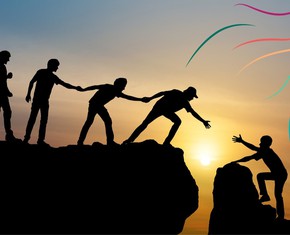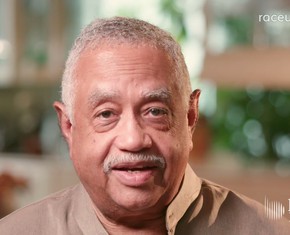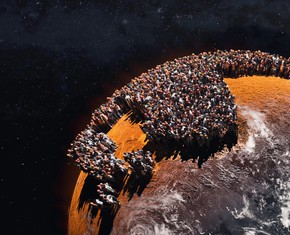The views expressed in our content reflect individual perspectives and do not represent the authoritative views of the Baha'i Faith.
Every time we experience yet another horrific mass shooter massacre in America, we can reliably predict the ensuing debate, which usually polarizes immediately along the usual lines.
People can be counted on to shout at each other across that dividing line, but we hardly ever calmly and rationally discuss one of the most important dimensions of the problem – our country’s lack of a cohesive, unified community.
RELATED: Why Do Americans Own So Many Guns?
Let’s see if we can do that here.
We’ll start with a basic spiritual principle: unity equals happiness. Think about it. When you’re with someone you love, with a family you care deeply for, with friends you feel closely connected to, you feel happy, fulfilled, complete. In the Baha’i writings, Abdu’l-Baha expressed that bedrock spiritual principle this way:
O ye beloved of God! Know ye, verily, that the happiness of mankind lieth in the unity and the harmony of the human race, and that spiritual and material developments are conditioned upon love and amity among all men.
In the United States, and in many other countries, we seem to have very little unity these days. We don’t just politely disagree with one another, we tend to split into opposing, hostile camps: politically, socially, racially, and even regionally.
Sadly, many have constructed their identities and our worldviews so they align with only one group or only one philosophy, and therefore tend to suspect, reject, or demonize other groups and philosophies.
Our for-profit news media and social media sources have exacerbated and even encouraged this disunified condition, because they’ve learned that the combination of conflict, controversy, and emotionally-charged issues produces clicks, eyeballs, readers, and revenue.
Then, when we experience the daily or weekly tragedies that have come to define American society in the eyes of the world, we split along those oppositional lines and argue fruitlessly once more, which makes every disastrous instance of pointless mass murder mind-numbingly repetitive. This cycle feels endlessly frustrating, producing “sound and fury, signifying nothing,” to quote Shakespeare’s Macbeth.
In a way, with this disunity so pervasive, we might view the repeated incidents of mass shootings, which seem senseless and random, as attacks on the fragmented nature of society itself.
Experts have concluded that’s what mass shooters really represent: the disaffected, deranged loner who sees his guns as a source of salvation, and who attempts to destroy our very concept of a unified community. After all, the word “mass” in the phrase “mass shooter” really refers to all of us, the vulnerable individuals who are trying to create a culture in a cohesive society.
Recently the author Peter Manseau – who is also the founding director of the Smithsonian National Museum of American History’s Center for the Understanding of Religion in American History – pointed this fact out in a perceptive article he wrote in The New York Times:
Mass shootings are, in a way, assaults on the idea of community itself. They occur where there are people gathered — for entertainment, for learning, for shopping, for worship — in the spaces we create together. Some believe that such attacks are the fault of armed individuals alone and can be addressed only through armed individual response. Others believe they occur within the framework of what we collectively allow and must have communal solutions.
That these two positions each have beliefs at their core is one reason our disagreements over guns remain so intractable. We are arguing not just over policy or public health, bans or background checks. Without quite realizing it, we are also arguing over the theologian Paul Tillich’s definition of faith: a matter of “ultimate concern.”
When the existentialist philosopher and theologian Paul Tillich wrote “Religion, in the largest and most basic sense of the word, is ultimate concern. And ultimate concern is manifest in all creative functions of the human spirit,” he added that “whatever concerns a man ultimately becomes god for him.”
If a deranged man’s ultimate concern is power, dominance, and “winning” in what he perceives as a hostile, dog-eat-dog existence, then killing others gathered in sociable groups might be viewed as a path to those goals, however insane the idea. If a deranged man’s racial or ethnic or class hatreds make him see others as threats to his existence, then the knee-jerk response, from the purely animalistic point of view of survival, is to attack and attempt to eliminate those threats. If society itself becomes the enemy, then killing what it represents by striking out against groups of people might seem reasonable to someone with no connection to it.
In a way, then, the old Darwinian concept of the survival of the fittest comes into play in this dynamic.
Most people forget the subtitle of Darwin’s legendary book On the Origin of Species – it is “by Means of Natural Selection, or the Preservation of Favoured Races in the Struggle for Life”. In the book, Charles Darwin famously said: “One general law, leading to the advancement of all organic beings, namely, multiply, vary, let the strongest live and the weakest die.”
Clearly, that law of the jungle, which Darwin called natural selection, works perfectly in the plant and animal kingdoms – but makes a terrible way of structuring human society. We humans, all religions point out, aren’t just mammals – we are spiritual beings.
RELATED: The Worship of Guns and the Decline of Religion
The Baha’i model opposes the ethic of survival of the fittest – not when it describes the science of natural selection, but when we try to practice it as an organizing principle for human relations. Instead, in a speech he gave in Washington, DC in 1912, Abdu’l-Baha said:
Material advancement has been evident in the world, but there is need of spiritual advancement in like proportion. We must strive unceasingly and without rest to accomplish the development of the spiritual nature in man, and endeavor with tireless energy to advance humanity toward the nobility of its true and intended station.
This spiritual advancement will become a reality, Abdu’l-Baha said, when we human beings start treating each member of the human race as a part of our family:
I have come here with this mission: that through your endeavors, through your heavenly morals, through your devoted efforts a perfect bond of unity and love may be established between the East and the West so that the bestowals of God may descend upon all and that all may be seen to be the parts of the same tree – the great tree of the human family.
How do we establish those bonds of unity and love? Every human being can begin, consciously and with purpose, in their own family. Then we can extend those ties of love to those we meet – our extended human family. Ultimately, we can join with groups of like-minded people, our fellow lovers of humanity, to spread these good intentions as far as we possibly can in the places where we live. When that truly happens, fewer and fewer people will feel like loners and strike out against society.
All over the world, every Baha’i community has activities focused on this goal of human oneness and unity, and everyone is welcome to join.
If we attempt to see beyond the concept of survival of the fittest as an organizing principle of the universe, and instead frame our view of existence around the Baha’i concepts of love for others, unity in diversity, and the oneness and inter-relatedness of the human family, we can begin to build a wider, more inclusive, and less threatening society – one that welcomes all people, reduces conflict and contention, and no longer impels the use of force and firepower.
















Comments
Sign in or create an account
Continue with Googleor